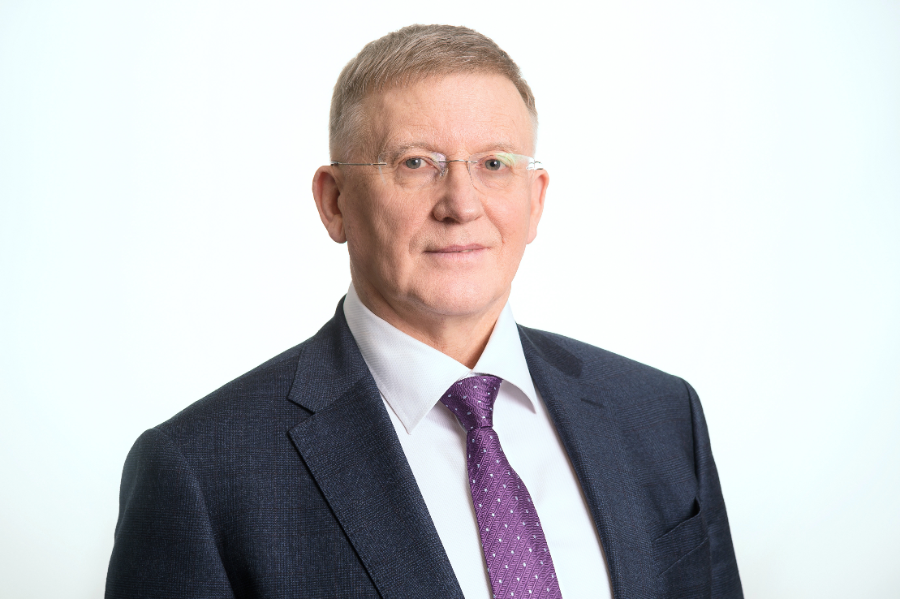Artificial intelligence has already migrated from the science fiction sphere to the production process, providing multiple advantages. South Ural State University (SUSU) was among the first in the country to engage in such projects. Aleksandr Shestakov, Rector, Doctor of Sciences (Engineering) and Professor, shares how far they have come in fulfilling those.

– It all started when our university obtained a supercomputer in 2000, – he says. – The first tasks, which we tackled back then, were digital twins: copies of physical objects and processes that help optimize the business. We used methods relevant to artificial intelligence. With this experience, we came to the industry, choosing companies operating in the global market as our partners.
– Magnitogorsk among them, for example?
– We have been friends with local metallurgists for a long time now. We jointly designed a system based on good mathematical calculations and predictive control. Today this system helps us to save energy resources. Now we are fulfilling a major project in a slitting lines shop. Here, in a real time mode, on the basis of the artificial intelligence methods, the condition of the equipment will be evaluated, what will allow to maintain it in good condition, and promptly take measures to avoid breakdowns and downtime.
We also strengthened our collaboration with SMS Group in Magnitogorsk. The German company was working on increasing the reliability of the mould on a continuous steel casting line. Molten metal flows through it and changes its structure. The problem is that the mould gets clogged. To understand what to do in such a situation, more than five hundred sensors were connected to the equipment, and the readings from them were transmitted not only to us, but also to the scientific centre in Germany. The research lasted for four months. The results were surprising not only to us: the German university took only the third place, and the first two places were taken by the teams of our university, who had been using different methods, including neural network technologies. Now we are preparing an agreement on collaboration with SMS Group in this field until 2030. We will be solving issues connected with the introduction of elements of the digital industry in the metallurgical production process.
Joint projects with other industry enterprises are being prepared. In particular, with the "white metallurgists". They are interested in evaluating pipes using high-resolution cameras and the artificial intelligence methods.
– Do Russian universities implement digital approaches successfully?
– We had started to develop the digital industry in the South Ural region even before it became a burning topic in our country. The first steps towards it coincided with the intensification of the activities of Emerson Corporation (manufacturing products for the oil and gas sector) in Chelyabinsk. The American company is now building the second phase of the plant, and back then, in order to offer their services in Russia, they needed a Russian university to collaborate with. Therefore, they invited our specialists to Texas, where they gave lectures on the digital industry, and at a fairly high level. They invested half a million dollars into the laboratory for the industrial process automation at SUSU. None of our industrialists invested that much. Today we are strategic partners with them. By the way, after completing the project in Magnitogorsk, we agreed with Magnitogorsk Iron & Steel Works to organize a joint design bureau on the digital industry.
– Did the collaboration with the American partners help to see new horizons? Europe has industrial economy, and America – post-industrial economy.
– I would not compare these two things when speaking about digital economy. Some companies have strong progress in digitalization of technological processes, while, for example, Siemens in Germany uses the principles of the digital industry in the development and design of various mechanisms. Besides, the Siemens centre was created at our university. We introduce the technologies elaborated there into the industry.
– What benefits do enterprises, which have chosen this high-tech path, gain?
– I would like to once again refer to the experience of others. Emerson Corporation changed its business paradigm for a reason. At first it specialised in sensors; after that, in the automation of processes; and today it operates according to the principles of digital industry. This approach increases production efficiency: equipment begins to work more reliably, maintenance becomes less costly, energy consumption is reduced, and the environmental damage is less severe.
If we summarize all the factors, it becomes clear that, in terms of exploration of the digital space, the outsiders, in comparison with the leaders, will be completely uncompetitive. That is why the new way of thinking is a matter of survival of an enterprise. This medal has also a reverse side. The digital industry and artificial intelligence methods can dramatically change the industrial landscape of the Chelyabinsk Region, as the new technological structure provides a higher level of profitability than today.
– Some say, that a digital Science City will soon appear near Chelyabinsk...
–Our graduates, who have their own businesses, have allocated about 25 hectares of land to the university for the artificial intelligence centre, where the scientific personnel will be trained and research will be conducted. We are also planning to open a student business incubator and a technology park at this centre. In addition, major companies of the digital industry sphere will take part in its development. All the achievements of the future Science City will be translated to the real sector.




